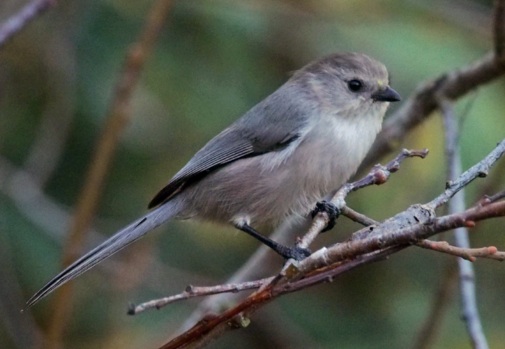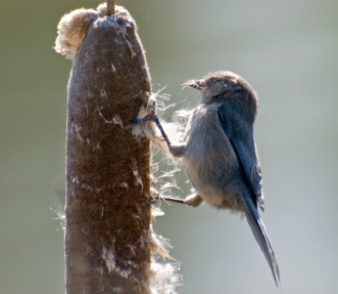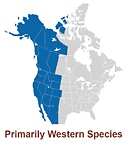A practical guide to bird watching in Sonoma County, California
(Unless otherwise indicated, all phone numbers are in the 707 area code)
A practical guide to bird watching in Sonoma County, California
(Unless otherwise indicated, all phone numbers are in the 707 area code)



Sexes similar, but females have pale yellow irises, males have dark eyes. Not likely to be confused with any other bird. Bushtit is our only very small, mostly grey, long-tailed bird. Although similarly grey, Oak Titmouse is larger and crested. Our Pacific Coast Bushtits differ slightly from birds seen in the interior by having a brown tinge, especially on the flanks and crown. The bird in the photo above is typical of the Pacific Coast race. The birds present in Sonoma County are often of this type, but not necessarily so. The bird in last picture on this page, for example, shows almost no brown at all.
Further reading:
Bolander and Parmeter, Birds of Sonoma County California, rev. ed., 2000, p. 91
Brinkley, National Wildlife Federation Field Guide to Birds of North America, 2007, p. 345
Burridge, ed., Sonoma County Breeding Bird Atlas, 1995, p. 118
Dunn and Alderfer, eds., National Geographic Field Guide to the Birds of North America, 5th ed., 2006, p. 338
Dunn and Alderfer, eds., National Geographic Field Guide to the Birds of North America, 6th ed., 2011, p. 378
Dunne, Pete Dunne’s Essential Field Guide Companion, 2006, pp. 471-472
Ehrlich, Dobkin, and Wheye, The Birder's Handbook, paperback edition, 1988, p. 432
Fix and Bezener, Birds of Northern California, 2000, p. 281
Floyd, Smithsonian Field Guide to the Birds of North America, 2008, p. 337
Kaufman, Field Guide to Birds of North America, 2000, p. 294
Kaufman, Field Guide to Advanced Birding, 2011, pp. 111
Lukas, Bay Area Birds: From Sonoma County to Monterey Bay, 2012, pp. 204, 207-208
Parmeter and Wight, Birds of Sonoma County California, Update (2000-2010), 2012, p. 54
Peterson, Field Guide to Birds of Western North America, 4th ed., 2010, p. 272
Peterson, Western Birds, 3rd ed., 1990, p. 260
Sibley, Field Guide to Birds of Western North America,1st ed., 2003, p. 323
Stokes, Stokes Field Guide to the Birds of North America, 1st ed., 2010, p. 530
Vuilleumier, American Museum of Natural History, Birds of North America: Western Region, 2011, p. 297
Voice: Cornell Lab of Ornithology: All About Birds--Bushtit
© Colin Talcroft, 2009, 2010, 2011, 2012, 2013
Unless noted, all photos by the author. If you would like to use one of my images, please ask for permission for non-commercial use with proper credit or commercial use with proper compensation.

Female Bushtit: Note pale iris
For comparison: Oak Titmouse.
Note crest (although this rain-bedraggled bird is holding its crest down),
heavier bill, proportionately large eye
Female Bushtit collecting nesting material
Spring Lake, Santa Rosa


Bushtit (male), Arroyo Sierra Dr., Santa Rosa, April 5, 2011
Male Bushtit, Spring Lake, Santa Rosa, November 7, 2012
Bushtit
Psaltriparus minimus
1990-2013 Sonoma County data. Graph provided by eBird (www.ebird.org), generated May 30, 2013
EBird reported occurrence in Sonoma County



